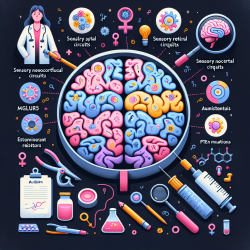Lighting the Path to Brighter Futures: Understanding the Role of Myo-Inositol in Depression
As professionals dedicated to improving the lives of children, it's crucial to stay informed about the latest research that can impact therapeutic strategies. A recent study published in Frontiers in Neuroscience has shed light on the relationship between myo-inositol levels in the anterior cingulate cortex (ACC) and melatonin rhythms in young individuals with depression. This research provides valuable insights that can be leveraged to enhance therapeutic outcomes for children and adolescents.
The Connection Between Myo-Inositol and Melatonin
Myo-inositol, a glucose isomer and glial marker, plays a significant role in brain chemistry. The study found that young individuals with depression had lower myo-inositol levels in the ACC compared to healthy controls. This reduction in myo-inositol was associated with delayed melatonin rhythms, which are crucial for regulating sleep-wake cycles.
Melatonin, a hormone that regulates circadian rhythms, is closely linked to myo-inositol production. The study suggests that disruptions in melatonin rhythms may contribute to the neurochemical changes observed in depression, particularly in the frontal cortex regions involved in emotional regulation.
Implications for Practitioners
For practitioners in speech language pathology, understanding the neurochemical underpinnings of depression can inform more effective intervention strategies. Here are some ways to apply these findings in practice:
- Incorporate Circadian Rhythm Assessments: Consider integrating assessments of sleep patterns and melatonin rhythms into evaluations for children with mood disorders. Identifying disruptions can guide interventions aimed at normalizing sleep-wake cycles.
- Collaborate with Multidisciplinary Teams: Work closely with mental health professionals to address the neurochemical aspects of depression. This collaboration can enhance the overall therapeutic approach and improve outcomes for young clients.
- Encourage Further Research: Advocate for continued research into the relationship between myo-inositol, melatonin, and depression. Understanding these connections can lead to the development of innovative treatments that target neurochemical imbalances.
Looking Ahead
While this study provides valuable insights, it also highlights the need for further research to fully understand the implications of myo-inositol and melatonin in depression. Future studies could explore whether interventions aimed at restoring melatonin rhythms can enhance myo-inositol levels and improve mood symptoms.
As we continue to unravel the complexities of depression, integrating these findings into practice can pave the way for more personalized and effective therapeutic approaches. By staying informed and embracing data-driven decisions, we can make a significant impact on the lives of children and adolescents struggling with mood disorders.
To read the original research paper, please follow this link: Lower In vivo Myo-Inositol in the Anterior Cingulate Cortex Correlates with Delayed Melatonin Rhythms in Young Persons with Depression.










